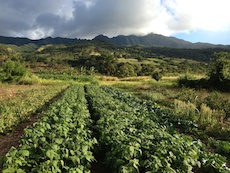Departing Honolulu and heading north past the military bases, I could feel my body begin to relax as the landscape shifted.
Even in the car, one senses an energetic shift in the land itself as you head to the North Shore—more open, less populated, and a bit of “old Hawaii.”
I had brought along a book to read aloud to my partner on the hour drive, but the afternoon light show on the cloud-draped Waialae Mountains was so dramatic that I soon laid the memoir aside and we both focused on the exquisite scenery, instead.
We were headed to a “farm to table” fundraiser dinner at an island farm. Guests had been invited to arrive an hour before dinner, to meet farmer Mark and some of his crew (some buff-colored hens, included), mingle socially, and stroll the land.
No sooner had I stepped out of the car and drawn a deep breath of fresh air, than my sandals were kicked off and I was barefoot. Perfect. Soles and soul equally happy to be on the earth—savoring the essential connection. I walked the farm in bare feet, toes wriggling down into the dry red, iron-rich dirt, with all my senses open wide.
Land in Hawaii is hideously expensive; a case of prime real estate always in demand yet only a finite amount available. A few years ago, Mark managed to buy a six-acre plot when it came up for sale—one of three agricultural parcels available as part of a larger sale of land held by the Dole Company (the rest sold to a developer). He realized the importance of keeping the land for agriculture rather than to let it become yet another site for oversize homes on acreage for the wealthy. Then he plunged into farming.
I have deep respect for those who choose to become farmers in a materialistic society such as ours (and a steadily increasing portion of the world). It’s a life of hard work, financial risk, and very little monetary gain—especially on a small scale—yet one that offers its own inestimable rewards.
A friend of mine in New Mexico, whom I deeply admire on many levels, left the high-paying, high-tech programming world and began raising organic tomatoes in an ecologically sustainable greenhouse (rainwater catchments, solar electricity, etc). That was more than fifteen years ago and he’s never looked back. He is a hero of mine.
The food at dinner was simple, fresh, and flavorsome, the bulk of the ingredients grown (or caught) locally: a grilled watermelon gazpacho with daikon radish and ancho chile; crostini topped with grilled escarole and green olive tapenade; a main course of pan-seared opakapaka (local pink snapper) with a lilikoi (passionfruit) vanilla sauce and sweet potato cakes, sauteed collard greens alongside; tequila lime bars with a dollop of whipped cream for dessert.
It was a meal that unfolded over a couple of hours as the tropical sun sank into the welcoming blue arms of the Pacific.
We sat with our friend and her companion, sipping lemonade or wine respectively between dinner courses, catching up and telling stories. Every so often, conversation organically halted as we simply marveled at the shifting light on the mountains, or comments floated about the sweet scent of the air as dusk descended.
I’ve often daydreamed about becoming a smalltime, organic farmer and beekeeper; a quiet, honest way of life that nourishes body and soul. Sitting out at the North Shore farm, a welcome change from the traffic and frenetic buzz of Honolulu, eating food fresh from the earth and sea, I found my old “back to the land” dream drawing near again.
Nature sings the same song as the soul.
As opposed to industrialized work that has become thoughtless and skill-less, working the land can yield a simple dignity that feeds the spirit—especially when that work done in a sustainable, conscious way. Not the least of its satisfactions is the sense of being something other than a consumer—being a producer, instead.
The industrialization of labor has long ago shifted us from “making” to “doing,” and frankly the vast majority of our modern work degrades body, mind, and soul. Enmeshed in a consumer economy, most of us won’t have the opportunity or choose to become something other than consumers (our entire, flimsy, “paper economy” is built upon it).
Yet we can make conscious decisions around consumption, reducing, reusing, and recycling. When we purchase food that was grown locally, we make choices that promote true sustainability—while directly supporting those who are supporting us.
Ultimately, the only sort of sustainable economy is a local one.
In my weekly blog, The Soul Artist Journal, I frequently say that Soul Artists are people who seek to offer something of value to the world—not merely for financial gain but because their soul has a gift that must be shared. The soul thrives when it creates, and we each have a “giveaway” to offer the world. In the journey of a conscious life, the personal ultimately becomes transpersonal.
Certainly, anyone who chooses to go back to the land and take up the mantle of organic farming is a Soul Artist of sorts. To farm with integrity is a noble calling. I’m saluting North Shore Mark, and New Mexico Paul, and my “apple queen” farmer friend, UK Sara, and countless, unsung others.
As I’ve shared in a previous piece for elephant journal on food and sustainability, “A Green Fork: What We Eat Matters,” “eating is an ‘agricultural act’… our actions matter.” That’s partly the reason I was at the farm dinner, donating money to help them build a state-approved approved kitchen for a new line of farm-based condiments they hope to sell.
Sitting with my partner and new acquaintances under the thatched roof, reveling in the evening’s gilded light and sense of timeless, tranquil grace, I felt a deep sense of gratitude—for Mark and his crew, for the cook and her assistants, for the grace of the table, for the beautiful evening sky, and for the land itself.
It felt as if my heart had expanded as wide as the bountiful field next to which we sat, and that it might soon be scattered with sparkling diamonds like the evening sky.
Gentle reader, though you may not have a direct connection with the land or persons who grew your food (even a small percentage of it)—most of us don’t—here’s hoping that you can still seek out local choices that benefit farmer, earth, and your body. Buy local.
Buy organic (the bees and pollinators-under-siege will thank you).
May you bless the food that’s on your plate, celebrate the grace of the table, and always share the best of what you have.
Relephant:
5 Ways to Boycott Factory-Farmed Products.
Bonus video: Waylon Lewis speaks with Joel Salatin
Author: L.R. Heartsong
Editor: Renee Picard
Photo: via the author












Read 0 comments and reply